The brain requires an intensive amount of energy to take care of the intentional and automatic functioning of the body. According to research, the brain uses around 20% of the calories used by the entire body throughout the day. For an organ of this size, this is a lot of energy that your body needs to make up for throughout the day. And the best way to acquire that energy is through healthy foods and dietary habits.
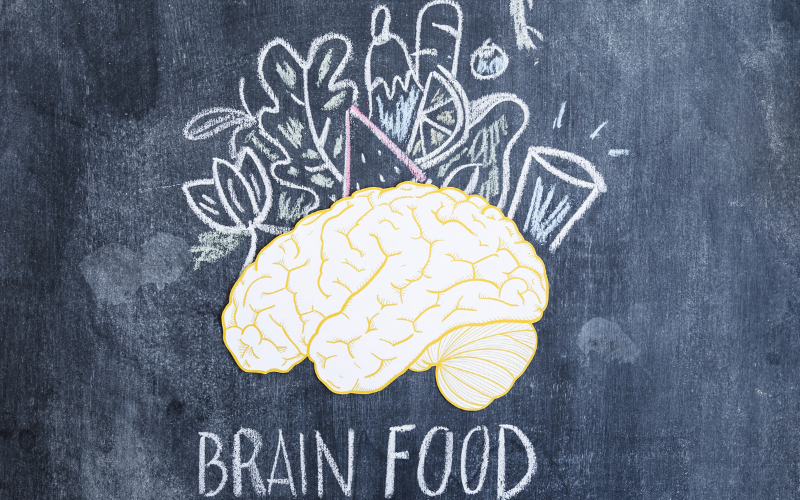
In this detailed guide, we are going to walk you through the 10 best foods that you can eat to boost your brain power.
Let’s get straight to it:
1. Nuts
Nuts are a healthy brain food with numerous benefits. Eating nuts can help improve your heart health. A healthy heart is essential for having a healthy brain. A study done on older adults revealed that consuming nuts regularly can reduce the risk of decline cognitive decline. Another study suggests that consuming nuts causes a considerable improvement in memory.
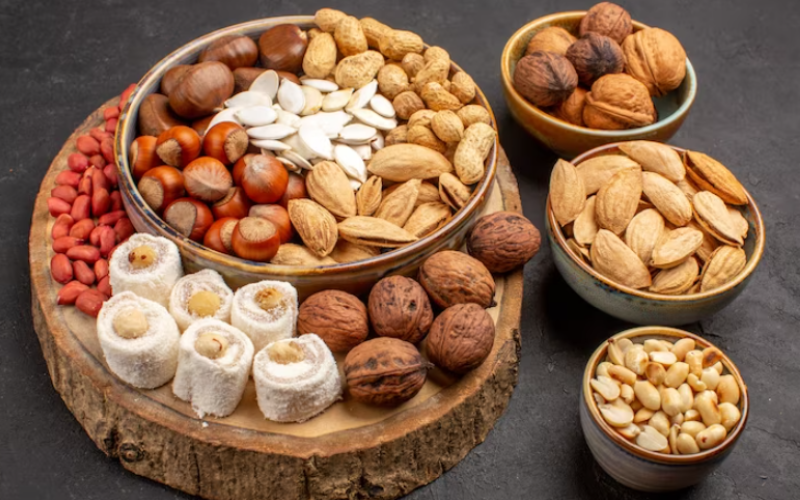
Benefits of Nuts
- Improves heart health.
- Sharpens the memory.
- Reduces the free radical damage.
- Anti-inflammatory effects.
Types of Nuts
Walnuts
Almost all types of walnuts are known for having excellent mood improvement effects. Walnut benefits for the brain include stress alleviation and improved mental health.
Almonds
Almonds are highly recommended for dealing with stress and anxiety. Along with that, the benefits of almonds for the brain include mental sharpness and improved cognitive performance.
Macadamia
Macadamia nuts benefits include the maintenance of healthy neurotransmitters in the brain. This nut helps improve communication between brain cells.
Pistachio
The benefits of pistachio nuts include improved cognitive performance. They contain omega-3 fatty acids and antioxidants responsible for enhancing brain performance. The nutritional value of pistachio nuts makes them a great choice for improving brain health.
Peanuts
The health benefits of peanuts include the improvement of the areas of the brain responsible for learning and memory. The nutritional value of peanuts increases blood flow to the brain to enhance mood and alleviate the symptoms of depression.
Brazil Nuts
Brazil nuts contain ellagic acid, which is known for mimicking the effects of an antidepressant. The health benefits of Brazil nuts include the serving of selenium that your brain needs to combat depression. These nutritional benefits of Brazil nuts make them ideal for improving brain power.
Tiger Nuts
The benefits of tiger nuts include the improvement of your gut health, which is directly related to the performance of your brain. The prebiotic properties of these nuts improve gut health, which complements your brain health in the long run.
Fox Nuts
Fox nuts offer many benefits, including being rich in thiamine, which improves the cognitive functioning of the brain. These nuts also help in improving the process of neurotransmission, allowing for better coordination between the brain and the body.
2. Fatty Fish
When we talk about foods that offer omega 3 benefits, Fatty fish is highly recommended. Fatty fish such as salmon and trout are one of the best omega 3 sources out there. They contain large amounts of omega-3 fatty acids, which complement your brain health.

Foods high in omega 3 are highly recommended for the brain. Around 60% of the brain is made of fat-containing omega 3s. This compound is also responsible for the product of nerve and brain cells.
Benefits of Fatty Fish
- Uses for the treatment of depression.
- Omega 3-rich food that alleviates BPD.
- Mood stabilization.
- Serves as a neuroprotectant.
- Excellent dopamine food.
3. Flax Seeds
Like fatty fish, flax seeds are also known for being rich in omega-3 fatty acids. So, they carry the same health benefits, contributing to a better mood. Among the brain-boosting foods, Flax seeds are often recommended to deal with mental health issues such as depression and other mental disorders. Along with mental health benefits, eating flax seeds is also great for weight loss and maintaining a healthy heart.
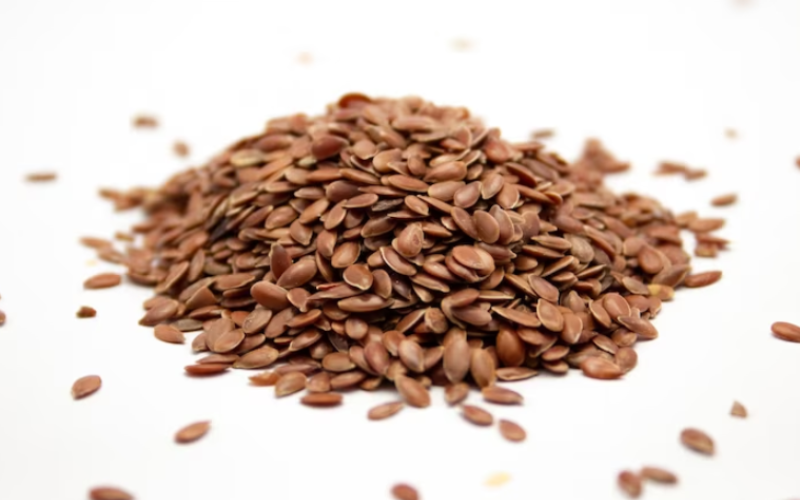
Health Benefits of Flaxseeds
- Helps combat depression
- Anti-inflammation properties
- Improved the mood
- Improves memory
4. Green Leafy Vegetables
Leafy vegetables are an excellent source of vitamins and nutrients. Examples of leafy greens include spinach, avocado, and kale, which feature essential nutrients such as vitamin K and beta carotene that improve the cognitive functioning of your brain.

Vitamin K in leafy veggies helps in the formation of fat inside the brain cells and is widely recognized for its memory improvement effects. Dark green leafy vegetables are the foods that improve memory and concentration.
Benefits of Dark Leafy Greens
- Boost cognitive functioning.
- Improved memory.
- Improved decision-making capabilities.
- Improved mental response.
Types of Green Leafy Vegetables
Avocados
Avocados contain tryptophan, which is an amino acid that improves your mood and mental health. Avocado health benefits include the regulation of the hormones. It also aids in the production of serotonin in the body. The medical benefits of eating avocado make it a great choice for improving your brain health.
Spinach
Spinach is rich in the antioxidant called lutein, which helps in removing toxins from the brain. Spinach’s health benefits make this leafy vegetable highly recommended for reducing the mental decline caused by the age factor. Spinach juice benefits are almost the same as well.
Kale
Kale is rich in vitamins A, C, and K. These are all essential for improving the performance of your brain. Also, Kale contains antioxidants that will enhance your mood and decrease the risk of depression.
Collard Greens
Collard greens contain choline, magnesium, and folate, which are all great for your mental health. These nutrients improve brain function, mood regulation, and memory.
Broccoli
Broccoli contains a wide array of vitamins and minerals that reduce the symptoms of depression. Mainly, this vegetable is great for handling the depression caused by inflammation.
5. Berries
Berries contain flavored antioxidants, which are good for brain health. Antioxidants help your brain by minimizing inflammation and the oxidative stress on the organ. The most common antioxidants in berries include anthocyanin, catechin, quercin, and caffeic acid. The consumption of antioxidants through berries improves the communication between brain cells.

Benefits of Berries
- Enhanced mental sharpness.
- Decreased mental decline.
- Faster mental response time.
- Improved mood and cognitive functioning.
Types of Berries
Blueberries
Blueberries reduce the risk of dementia, prevent age-related memory loss, and increase concentration and focus. They also boost the performance of brain cells.
Raspberries
These berries are high in nutrients and antioxidants, which help improve cognitive health. They also help minimize the risk of developing chronic brain performance-related diseases such as memory issues.
Cranberries
Cranberries can improve your visual episodic memory, neural functioning, and the delivery of blood to the brain. These berries are known for significantly improving short-term memory.
Juneberry
Juneberries are a great source of iron for the body. They also contain considerable concentrations of potassium, magnesium, and phosphorous that contribute to better brain health.
Black Currant
Black currant consumption can improve your cognitive performance while minimizing cognitive decline at the same time. It can also alleviate the effects of dementia.
Palm Berries
Palm berries are known for having great antioxidant and anti-inflammatory effects. These mechanisms are great for improving brain functioning.
Boysenberries
These berries are great at reducing the oxidative stress that may lead to depression. They also reduce stress caused by inflammation in the body.
Marionberries
Marionberries contain antioxidants such as anthocyanins that improve the cognitive function of the brain. These berries also reduce the risk of age-related decline in cognitive functioning.
Loganberries
Loganberries are rich in thiamine, which is great for maintaining a healthy nervous system. This berry can also repair the damaged nerve cells.
6. Eggs
Eggs are an excellent source of several nutrients that are directly related to brain health. These include vitamins B6, B12, folate, and choline. For example, choline is an essential micronutrient that your body uses to make acetylcholine. This compound helps regulate your mood and memory. Egg nutritional benefits improve the cognitive functioning of your brain while improving brain health at the same time.

Health Benefits of Eggs
- Reduced risk of anxiety.
- Alleviate symptoms of stress.
- Aids in peaceful sleep.
- Improved mood and mental well-being.
7. Whole Grains
Whole grains are a great source of vitamin E for the body. Vitamin E is a nonenzymatic antioxidant that reduces the oxidant changes in your body that result from mental stress. Health specialists all over the world recommend vitamin E to combat the symptoms of depression. Examples of whole grains list include quinoa, barley, brown rice, fiber in brown rice, millet, farro, and millet.
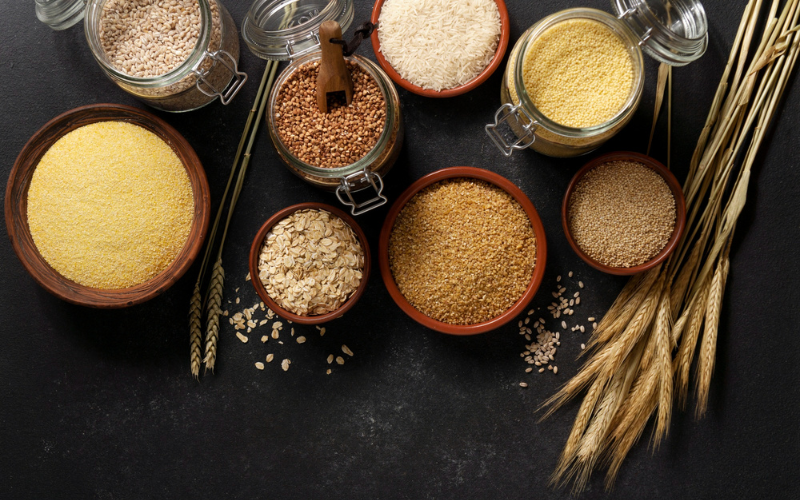
Whole Grain Benefits
- Maintain healthy serotonin levels.
- Improved mood.
- Regulates your memory.
- Alleviates symptoms of anxiety.
8. Tomatoes
The nutritional value of tomatoes is based on the presence of a powerful antioxidant called lycopene. This chemical helps your body and brain against cell damage caused by free radicals. Also, consuming tomatoes has been associated with the alleviation of mild depression symptoms. You can consume tomatoes in the form of a drink as well. This is because the benefits of drinking tomato juice are similar to what you get with their consumption in the solid state.
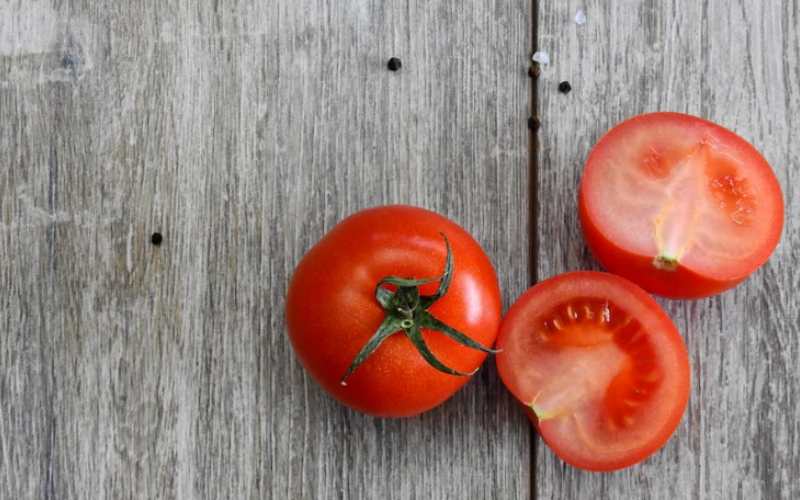
Health Benefits of Tomatoes
- Protects brain, heart, and gut health.
- Great source of vitamins and essential antioxidants.
- Improves mental wellbeing.
- Protects brain cells against damage.
9. Oranges
Oranges are revered as one of the best sources of Vitamin C that you can find there. Vitamin C is one of the key nutrients for combating mental decline. A study suggests that vitamin C is capable of improving focus, memory, and attention as well as decision-making. Also, Vitamin C and the nutritional value of oranges can help fight off free radicals that might cause damage to brain cells.
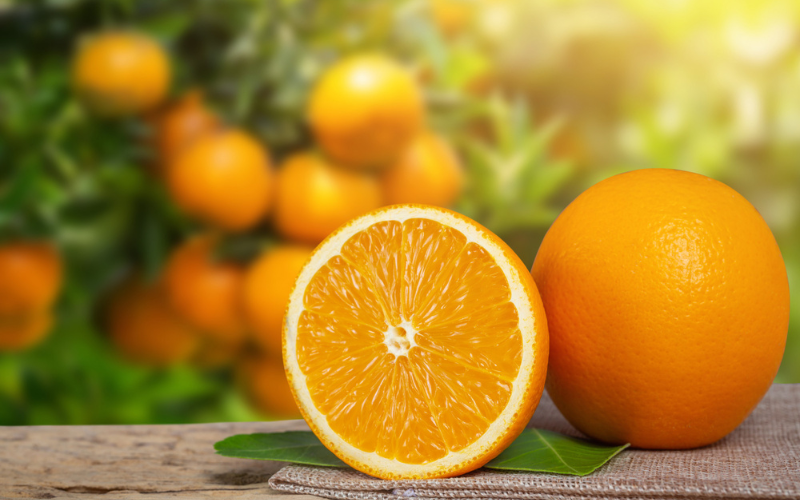
Health Benefits of Eating Oranges
- Helps combat stress and anxiety.
- Puts you in a better frame of mind.
- Alleviates depression.
- Protects your brain against the damage of free radicals.
10. Beans
Beans include B vitamins such as B-12 and folate that can help prevent or reduce the symptoms of depression. Beans also contain fiber, protein, magnesium, and iron, which are required by your body on a daily basis. There are many different types of beans available out there, including black beans, chickpeas, lentils, navy beans, and red beans, each having their specific brain health benefits.
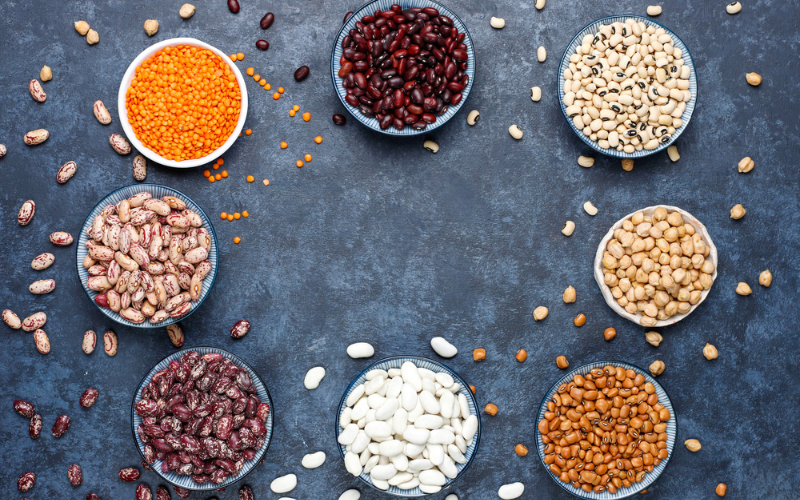
Health Benefits of Eating Beans
- Improves mood and mental well-being.
- Rich in vitamins and minerals essential for the body.
- Alleviates weakness, irritability, and fatigue.
- Helps reduce cognitive decline.
Final Words
Although improving brain power is a lot more complicated than it may seem, healthy food choices can certainly play a huge role in making the journey easier for you. The superfoods that we have talked about in this article are all great for individuals who want to improve their memory and concentration while combating cognitive decline at the same time.
Visit our blog to learn more about the latest health and lifestyle tips and guides.



0 Comments